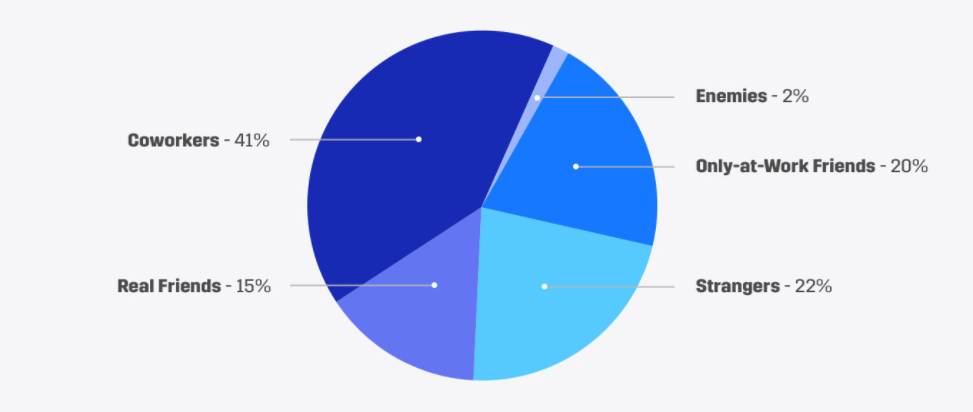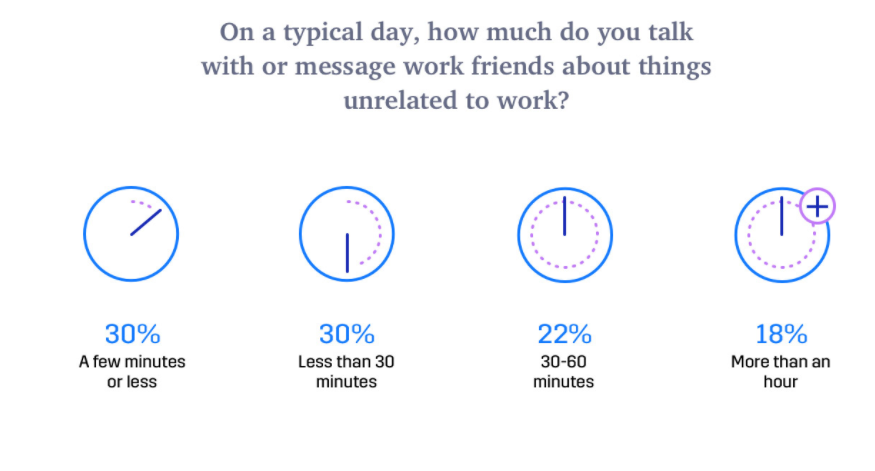Work friends might be great for you and your organisation, but apparently most people think of their coworkers as just that – coworkers.
There are plenty of studies highlighting the benefits of having friends in the workplace. We’ve even reported on the topic ourselves, and no one can argue against the benefits.
In fact, according to author Tom Rath, via this Sydney Morning Herald article, employees who have “best friends” at work are seven times more likely to feel engaged in the work they’re doing and if three of them are what Rath calls “vital friends”, employees are 96 per cent more likely to be satisfied with their lives.
But a recent US study from Olivet Nazarene University, surveying 3,000 workers, revealed that having close friendships at work is not that common. The majority of workers (41 per cent) consider the people they work with purely as colleagues and almost a quarter of respondents thought of their co-workers as strangers.
Of the 15 per cent that reported having “real friendships” with people from their work, the average number of work mates was five. Senior level workers were more likely to have more friends than their entry-level counterparts, and only 29 per cent would consider these people as their “best friends”. It would be interesting to know the stories behind the 2 per cent of people that report having an enemy at work. Hopefully they don’t take things too far.
Where should you work to make more mates?
According to the study, the industry you work in dictates how many friends you’re likely to have.
Transportation, finance and accounting were considered the industries to have the most friends, with the legal and real estate sectors coming in last. There’s no need to start feeling sorry for all the lawyers and real estate agents in America though, because 76 per cent of all respondents say they’re perfectly content with the number of friends they have.
Anthropologist Robin Dunbar says the size of our brains directly correlates with the amount of social relationships we can nurture, concluding that we can only really have five “close friends” at a time. If you count your childhood best friend, those few mates you keep in touch with from university and perhaps your partner, that doesn’t leave much room for work mates.
Of course, you could always choose to disregard Dunbar’s advice completely and continue collecting friends as you move through life, it’s just a theory after all. But if you ever need an excuse not to get close to your colleagues, just tell them your brain isn’t big enough to take on any more relationships.
Interestingly, HR and recruiting teams were placed in the “make friends slowest” category, alongside healthcare, engineering, finance and banking and government. The quickest to make friends were the insurance, marketing, advertising, PR, hospitality, retail and real estate sectors.
Culturally diverse friends can boost your creativity
The benefits of a culturally diverse workforce are obvious, but have you ever thought about how cultural diversity could benefit your work life on an individual level? According to new research from MIT Sloan, having an intercultural relationship – be it romantic or a friendship – increases your own creativity levels.
A variety of people were surveyed – those who’ve dated someone from both their own country and another country, foreign nationals who previously worked in the US on a J-1 visa and returned home and people who are currently working in the US. Across the multiple studies conducted, the researchers were testing to measure participants ability to come up with multiple ideas and find the best solutions to a problem. Both incredibly valuable skills in the workplace.
Those who remained in touch with their friends in America, after returning to their home country, showed better outcomes in innovation and entrepreneurship than others.
The determining factor for positive creativity results was not the amount of intercultural relationships one had fostered, but the duration of the relationships, suggesting those who were involved in a deeper cultural learning showed better results.
“For us, creativity is about connecting dots,” said the researcher Jackson Lu. “Every time someone enters a close relationship with a person from a different culture, they collect more dots to connect to the ones they already have.
“These relationships can also enhance your cognitive flexibility, which means that not only do you have more dots, but you’re in a better position to connect them all,” he said. “Intercultural relationships force you to switch your cognitive framework. You realise there are differences, and that really pushes you outside the box.”
So, while some employees might be hesitant to strike up a friendship with their desk buddy, it’s in an employer’s best interest to encourage these friendships in order to get those creative juices flowing.
Image by Elevate via Pexels.
Help your employees better understand their responsibilities for conduct in the workplace with AHRI’s online elearning modules on ethics and conduct.



